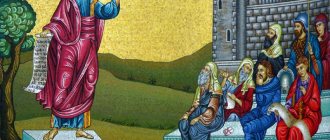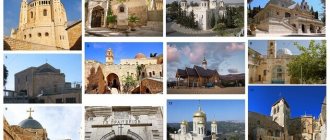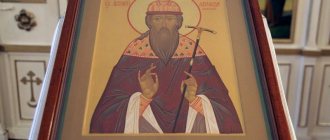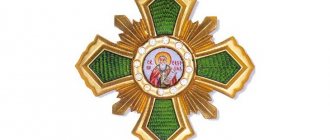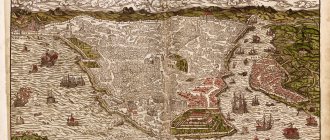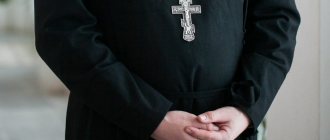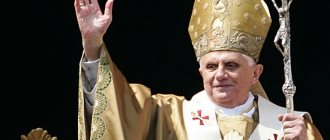Who are apologists
An apologist is a defender of Christianity, a person who defends Christian doctrine before government officials. This was also the name given to early Christian writers who supported the new religion and denounced paganism.
The main task of the apologists was to achieve official recognition of the Christian religion from the authorities. The pagans came up with many myths and slandered Christians, accusing them of involvement in incest and infanticide. Advocates aimed to debunk these myths. As arguments in favor of Christianity, they talked about the high morality of believers and talked about the miracles that Christ performed.
Apologists - authors who defended Christian teachings from critics
The miracles created by the Lord and his devotees were opposed to the witchcraft of pagan shamans. Apologists tried to convey to ordinary people and authorities that sorcerers are driven by dark forces, while the Lord came to Earth to save everyone living on it.
Ratings
- Philippe Bobichon, Dialogue with Tryphon
, critical edition, vol. I: vol. 2. - Annals XV
44. Let him investigate for himself sobre la traducción correcta del text:
Therefore, in order to get rid of rumors, Nero divided the criminals and punished them with the most sophisticated punishment, whom he called Christians, with unpopular atrocities.
[…] Accordingly, those who confessed were first captured, and then, according to their information, a great many united not so much in the crime of arson, but in hatred of the human race . - Minucius Felix, Octavius
IX 6; 31, 2 - There is a reprint made in 1969 in Wiesbaden and the entire work has been scanned and is available through Google books
.
Goals of Apologetics
Apologetics always corresponds to the currents of time, choosing with its problems what is most relevant at the moment:
- designed to expose pseudoscientific attacks on Christianity;
- seeks ways to protect Christian society;
- strives for a deeper understanding of the Holy Scriptures.
This is interesting! In early Christian apologetics there were two directions - towards Jews and pagans. Afterwards, apologetics was aimed at eradicating the distortion of faith within Christianity itself, at preserving the purity of beliefs and morality of believers.
Other Western parents
Isidoro de Sevilla, J. Alcoverro (1892, Madrid).
The Church of the West includes Pope Leo I the Great († 461); the father of Western monasticism, Benedict of Nursia; various bishops of Gaul, such as Cesareo de Arles (470–543), who formulated the Dogma of Grace; Gregorio de Tours; Hilary de Poitiers; Hispanic Parents Group
, in which Hosio de Cordoba stands out;
Martin de Braga; and the brothers Leandro de Sevilla (†600) and Isidoro de Sevilla (560–636), authors of the first Christian encyclopedia entitled " Etymologies".
; and, completing the cycle, the English Bede the Venerable (673–735), who continued the work of wisdom of Isidore of Seville.
In addition to the Fathers of the Church, both Eastern and Western rites, patristics studies the work of many other Christian writers who also received the title “Fathers of the Church.” The numerous works of these writers over the centuries continue to be a true guide in approaching the ideas and teachings of the Church.
Activities of early Christian apologists
The first apologists came from the elite of society. They defended the tenets of faith from the criticism of Jewish philosophers and supporters of paganism.
Fronto, the emperor's mentor, is considered the main opponent of the first Christians. He considered the beliefs of believers absurd, based on prejudices and fanaticism. Such views could destroy the familiar ancient world, so opponents of Christianity tried to prove that the new religion was hostile. Apologists sought to convey to society the truth and acceptability of their religion.
Important! The activities of the defenders were able to weaken the persecution of the authorities and prepare society to accept the new religion.
List of church fathers
The following table shows the major Church Fathers in alphabetical order, with their death dates in parentheses.
| Greek parents | Hispanic parents |
| Andrei Kritsky (d. 740) | Ambrose of Milan (d. 397) |
| Aphraat (4th century) | Arnobio de Sicca (b. 330) |
| Arkelao (Art. 282) | Augustine of Hippo (d. 430) |
| Athanasius of Alexandria (d. 373) | Benito de Nurcia (b. 550) |
| Sinait Athanasius (d. 700) | Cesareo de Arles (b. 542) |
| Athenagoras of Athens (2nd century) | Juan Casiano (b. 435) |
| Basil the Great (b. 379) | Celestino I (b. 432) |
| Cesareo de Nazianzo (b. 369) | Cornelius (b. 253) |
| Clement of Alexandria (b. 215) | Cyprian of Carthage (b. 258) |
| Clemente Romano (b. 97) | Damas (b. 384) |
| Cyril of Alexandria (b. 444) | Dionisio (b. 268) |
| Cyril of Jerusalem (b. 386) | Oenodius of Pavia (d. 521) |
| Didim the Blind (b. 398) | Eukerio of Lyons (b. 450) |
| Diodorus de Tarsus (b. 392) | Fulgencio (b. 533) |
| Dionysus the Great (f. 264) | Gregorio de Elvira (d. 392) |
| Ephraim the Syrian (d. 373) | Gregory the Great (b. 604) |
| Epifanio (b. 403) | Hilario de Poitiers (b. 367) |
| Eusebius of Caesarea (d. 340) | Ildefonso de Toledo (b. 667) |
| Eustatius of Antioch (b. 4th century) | Innocent of Rome (d. 417) |
| Firmiliano de Cesarea (b. 268) | Ireneo de Lyon (b. 202) |
| Genadius I of Constantinople (5th century) | Isidore of Seville (b. 636) (last of the Western Fathers) |
| Germanus I of Constantinople (d. 732) | Jeronimo de Estridon (b. 420) |
| Gregory of Nazianzus (d. 390) | Lactantio (b. 323) |
| Gregory of Nyssa (d. 395) | Leandro of Seville (b. 600) |
| Gregory the Great (b. 268) | Pope Leo the Great (b. 461) |
| Hermas of Rome (2nd century) | Mario Mercator (b. 451) |
| Hippolytus of Rome (d. 236) | Mario Victorino (fh 382)) |
| Ignatius of Antioch (b. 107) | Martin de Braga (b. 579) |
| Isidoro de Pelusio (b. 450) | Minusio Felix (2nd century) |
| John Chrysostom (b. 407) | Novaciano (f. 257) |
| Juan Climaco (b. 649) | Selected (initials IV) |
| Juan Damasceno (b. 749) (last of the Eastern Fathers) | Hosio Cordoba (b. 357) |
| Pope Julius I (b. 352) | Paciano (b. 390) |
| Justin Martyr (b. 165) | Pamphilus of Caesarea (d. 309) |
| Leontius of Byzantium (6th century) | Paulino de Nola (b. 431) |
| Macarius the Elder (b. 390) | Pedro Crisologo (b. 450) |
| Maximus the Confessor (b. 662) | Febadio (f. siglo IV) |
| Meliton of Sardis (l. 180) | Rufinus of Aquileia (d. 410) |
| Methodius of Olympia (b. 311) | Salviano (abbreviation V) |
| Neil the Elder (b. 430) | Pope Siricius (b. 399) |
| Origenes (f. 254) | Tertuliano (b. 222) |
| Polycarp of Smyrna (b. 155) | Venancio Fortunato (b. 610) |
| Proclus of Constantinople (d. 446) | Vicente de Lerins (b. 450) |
| Pseudo-Dionysius the Areopagite | |
| Serapion (f. 370) | |
| Sophronio (b. 638) | |
| Tatian (2nd century) | |
| Theodore of Mopsuestia (d. 428) | |
| Theodoret of Cyrus (b. 458) | |
| Theophilus of Antioch (2nd century) | Note: sometimes Bede the Venerable is added to the list of Latin fathers (l. 735). |
Theology and Apologetics
Apologists became the founders of Christian theology. Apologetics later became a branch of theology devoted to justifying the truth of the Christian faith using rational means.
Apologists made significant contributions to the development of Christian theology
There is a fundamental difference between classical theology and apologetics. Theology explains the concept of God and the Church, collects and generalizes the experience of church life. Apologetics, as a part of theology, seeks confirmation of Christian revelations, defends the truth of religious doctrine and repels the attacks of atheistic and non-Christian movements.
Also read:
- Professor of Theology Alexey Ilyich Osipov
- Orthodox theological courses
Bibliography
- Enrique Molina, Church Fathers
, Word Editions, Madrid, 1995, ISBN 84-8239-018-X - Dizionario patristico e di antichità cristiana
, Editorial Marietti, Casale Monferrato 1983, ISBN 88-211-6706-2 - Hubertus Drobner, Patrologia
, Ediciones PIEMME, Casale Monferrato 1998, ISBN 88-384-4563-X - Johannes Quasten, Patrology.
I primi due secoli II-III , Editorial Marietti, Casale Monferrato 1980, ISBN 88-211-6702-X - Enrique Contreras - Roberto Peña Oxo, Introduction to the Study of the Fathers: The Ante-Nicene Period
, ed. Monasterio Trapense de Azul, Azul 1991, ISBN 950-99640-0-X - Berthold Altaner, Patrologia
, Ediciones Marietti, Casale Monferrato 1992, ISBN 88-211-6700-3 - Daniel Ruiz Bueno, Greek Apologetic Parents
, BAC Madrid 1979, ISBN 84-220-0147-0
Sections of apologetics
Apologetics, as a part of theology, has its own structure. It includes five sections:
- general;
- scientific;
- philosophical;
- legal;
- moral.
By falling into sins, Christians give opponents of the faith a reason to strengthen their beliefs and convince those who doubt them. The calling of a Christian is to lead people on the path of salvation through his life and example. Every Christian makes his own contribution to the development of the moral section of apologetics.
Lyrics
Almost all of the texts mentioned can be found in the Codex of Areta in the Bibliothèque Nationale de Paris (called Codex Parisinus
451. This was
the corpus apologetarum
, which Bishop Aretas of Caesarea collected about 914.
There is also a critical edition with commentary in Latin by Johann Carl Theodor von Otto between 1847 and 1881, Corpus Apologetarum Christianorum saeculi secundi
. [ 4 ] Add works of questionable attribution and false ones.
Late apologetics
In early times, apologetics opposed paganism, in the Middle Ages - against Judaism and Islam, now - against atheism.
In the first centuries of Christianity, believers were accused of wanting to destroy the state and promoting debauchery and infanticide. The very idea of monotheism was considered blasphemy. The first Christians were subjected to terrible torture: they were burned alive, given to be eaten by wild animals, and buried alive in the ground. They were considered representatives of sects, and Christ was considered a deceiver. Thanks to the first apologists, Christianity survived and gave the world its greatest culture.
After Christianity officially acquired the status of a religion, the fight against pagans ceased to be the main goal of apologetics, since they became practically powerless. After this, the activity of defense writers began to fade. The place of the first apologists was taken by fighters against heresy and dissent.
Discussions about the historicity of Jesus Christ are one of the tasks of apologetics
Now a difficult time has come for Christians - on the one hand, there is godlessness, the popularization of atheism, on the other, there is an abundance of totalitarian sects, because there are more and more new groups every year. This requires the activation of apologists for Orthodoxy.
It is sometimes said that apologetics is unnecessary because accepting a belief is a voluntary act. Whoever wants to will come to faith despite difficulties. The task of apologetics in the modern world is to prove that the Holy Scriptures do not contradict scientific data and to support wavering minds.
opponents
The apologies, written to rebut Jewish criticism, deal with topics such as the Old Testament brought to its fulfillment by Christianity, the identification of Jesus of Nazareth with their expected Messiah, and topics related to liturgy. This was done by using the Old Testament and demonstrating Christian interpretation of passages and stories.
The writings of pagan intellectuals, as well as the persecutions unleashed by the Roman emperors, were another source of apologetic writings. As a result of the conversion of Constantine and the adoption of Christianity as the state religion in Rome, these writings were destroyed, and in most cases what was preserved was what the apologists themselves quoted.
The first general persecution was carried out by Decius between 250 and 251. Since there were no known crimes that could lead to conviction (accusations of anthropophagy and incest circulated due to the strange nature of the meetings, which Christians were supposed to celebrate by breaking bread). The very name "Christian" was believed to be enough to cause punishment. Therefore, Christians believed that by turning to emperors they could achieve justice and protection. Therefore, many apologetic texts were written with the participation of the emperor as a literary interlocutor. Drobner states:
If being a Christian is grounds for condemnation, then all Christians should always be persecuted by the state, and not just after making a complaint, as Trajan suggested in his letters to Pliny the Younger in 112. crime is being a Christian
P. 125
The accusations were very different: impiety, atheism, cannibalism and even infanticide. Tacitus, speaking of the fire of Rome in his Annals
” and speaking of the accusations brought against Christians, speaks of them as people who despise the human race. [2]
There is also evidence of a speech by Marco Cornelio Frontona, which he would have written against Christians. [3] Luciano de Samosata around 170 in his De morte peregrini
ridiculed Christian beliefs in the afterlife and brotherly charity.
Celso, with his "True Discourse
", was most harsh in his criticism of Christianity, which he described as a collection of superstitions and fanatics.
This criticism and ridicule continued with later authors and characters such as Porfirio or Giuliano.
external reference
- Wikimedia Commons has a multimedia category dedicated to the Church Fathers
. - Complete Latin Patrology of Migne (in Latin)
- Complete Greek patrolology of Migne (in Greek and Latin)
- Church Fathers at FirstChristians.com.
- Patrology by J. Quasten.
- Church Fathers on ICatol.net.
- Church Fathers website.
- Patrologia Latina online database.
- The Apostolic Fathers and some of their writings.
- Holy Fathers of the Greek Church at Apocatastasis.com. Information from: Eusebio, Atanasio, Basilio, Gregorio, Juan Crisostomo, Teodoretto, Cirilo, Proclus, Juan Damasceno, Justin, Flavio Clemente, Origen.
- "The Way of the Fathers" (in English)
- Texts in English by the Early Church Fathers.
| Control of authorities |
|
- Data: Q182603
- Multimedia: Church Fathers


